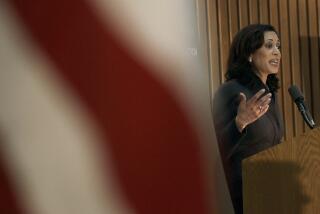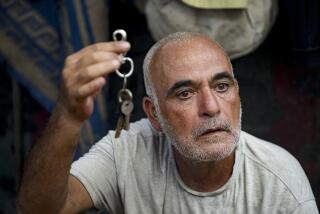Childhoods Bought, Sold -- Sometimes Rescued
- Share via
YEJI, Ghana — The house is filled with children, but has little of their laughter. These boys and girls have lost much of their childhood to long hours and rough treatment working for fishermen.
A few play with balls, or play games on the porch. Others help with the laundry. But on a bright summer day, most are draped listlessly over the furniture, sleeping or staring into space, while the international aid group that freed them tries to trace the parents who sold them into what was essentially slavery.
Their future is uncertain, and the fight against child trafficking in West Africa is far from over. Only in July did Ghana’s parliament pass a bill against child trafficking, and it still awaits the president’s signature.
Among the children at the house near Accra, Ghana’s capital, is 15-year-old Kwabena Mensah. He says his mother sold him as a fisherman’s helper when he was 8, hoping it would be a short stint to pay his way through school. Instead, he spent seven years doing a dangerous job 13 hours a day, earning little beyond regular beatings from the man he calls “my master.”
“It burns me to know that I spent my life with my master, because whenever I walk with people my age and they’re talking about school, I can’t say much, because I spent the life I should have had in school with my master,” Kwabena said.
Kwabena was one of more than 100 children rescued this year in Yeji, a fishing community on Lake Volta, 300 miles from Accra. The independent International Organization for Migration says that since launching the Yeji Trafficked Children Project in December 2002, it has reunited 537 children with their parents or other guardians.
Fishermen or go-betweens typically offer parents the equivalent of $20 to $120 plus future wages for children as young as 4. The parents rarely see the future wages.
Fishermen value the children for their small hands and make the youngsters dive to disentangle nets. Some drown. And upon liberation, nearly all the children tell of beatings, irregular meals and harsh living conditions, rescuers say.
Joseph Rispoli, the International Organization for Migration’s project director, said nearly all the children had suffered malaria, amoebic diseases and psychological trauma. “Most children need at least a couple of years of regular counseling” plus medical care in order to heal, Rispoli said.
His organization offers fishermen small loans and job training in exchange for freeing the children. Recipient Gabriel Kudomor, a fisherman for 23 years, released 13 children in 2003 and set up a poultry farm. He now speaks out against child trafficking.
“Too many children were dying,” he said.
Using information from the fishermen, rescuers find the children’s parents. , “We give [children] back to the people that sold them, because there aren’t too many options,” Rispoli said.
Finding parents can be difficult. Empty-eyed Abena, 5, was sold a year ago and doesn’t remember her mother. She doesn’t know her last name; neither does the fisherman who bought her.
Rescued children spend two months at the house on Accra’s outskirts. Doctors, nurses, social workers and psychologists are on hand round-the-clock to rehabilitate them. The exhausted children catch up on sleep.
For Kwabena, it’s heaven. “We play free, we eat free and nobody beats us,” he said softly, with a slight smile. He is about to be released to the mother who sold him. His hands still shake.
To dissuade parents from selling their children, the International Organization for Migration says, it pays for two years of the children’s schooling as well as job training for parents.
School is prohibitively expensive in Ghana. Fees are about $5 a year but books and mandatory uniforms can add $60 to that sum -- about two months’ earnings in the country.
Some fishermen and parents have faked trafficking claims to try to get money, Rispoli acknowledges.
The agency first tries to persuade fishermen to free children, telling them about the possibility of loans to start new businesses. The group can’t count on police or other backing from the resource-strapped government.
A 2001 study by the United Nations’ International Labor Organization estimated that 1.3 million Ghanaian children -- about 20% -- were engaged in child labor. (It defined child labor as any employment of children younger than 13 and “hazardous” employment for youths 13 to 17.) Among the most common internal trafficking in Ghana is of rural boys taken to the Volta region for fishing work, the U.S. Labor Department says.
Even if child trafficking is outlawed, it’s unclear how Ghana will arrest and prosecute violators or cope with large numbers of freed children.
“There will be the burden of reintegration of victims in society. This will be a problem for the social welfare of the country,” said Jack Dawson of the International Organization for Migration.
But the job needs to be done, he said. “They have talents buried in them. We need to free them so they can develop their talents.”
More to Read
Sign up for Essential California
The most important California stories and recommendations in your inbox every morning.
You may occasionally receive promotional content from the Los Angeles Times.












